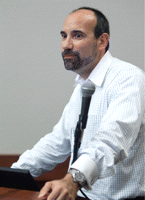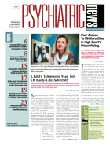Jose Maldonado, M.D., an associate professor of psychiatry at Stanford University, studied to become a priest before deciding on a career in psychiatry instead. And during the time he spent in the seminary, he learned how to perform hypnosis—a skill that he uses today in his psychiatric practice.
Maldonado discussed the use of hypnosis in medicine, as well as other aspects of the technique, at the APA annual meeting in Honolulu in May.
Hypnotic ability, Maldonado explained, depends on being able to become intensely absorbed in something to the point that you don't know what is going on around you (dissociation). For example, some people can get so caught up in reading a book that they aren't aware of their surroundings. You also have to be suggestible—that is, willing to take an idea from someone else, then assume it as your own. "We believe that the ability to be hypnotized is a trait," he said. In other words, a person has a lot of it, some of it, or none of it, similar to musical talent. Most people fall in between. About two-thirds of the population has hypnotic ability, he said, adding that people who are experiencing psychosis, however, cannot be hypnotized.
Some insight into how hypnosis works is described in a study reported in the August 2000 American Journal of Psychiatry, Maldonado said. The study's senior investigator was David Spiegel, M.D., who is the associate chair of psychiatry at Stanford University and well known for his hypnosis research.
Spiegel and colleagues asked highly hypnotizable subjects, under hypnosis, to visualize a color pattern and meanwhile viewed the subjects' brains with PET scans. The scans showed that areas of the subjects' brains that are normally involved in color perception became activated.
"These findings support the claim that hypnosis is a psychological state with distinct neural correlates and is not just the result of adopting a role," Spiegel and his group concluded. Or as Maldonado said at the annual meeting, "The study showed that hypnosis is a state with distinct brain changes."
There are a number of misconceptions about what hypnosis can and cannot do, Maldonado continued. Contrary to some people's belief that hypnosis is a truth serum, "You can lie under hypnosis." And contrary to some people's belief that hypnosis can produce false memories, only l out of 100 people who are hypnotized will develop false memories. Moreover, the widely held contention that people can be made to do terrible things under hypnosis is false.
Hypnosis can help counter a number of psychiatric conditions, Maldonado reported—for example, anxiety over receiving chemotherapy, a bone-marrow aspiration, or other medical procedures; bulimia; conversion disorder; and posttraumatic stress disorder. Hypnosis can also help treat conditions that have a psychiatric component, he added, such as asthma, insomnia, irritable bowel syndrome, peptic ulcers, chronic pelvic pain, pain during labor and delivery, and warts. When warts are removed surgically, 70 percent return. "A wart removed by hypnosis never comes back," Maldonado declared.
In addition, hypnosis has anywhere from a 20 percent to 64 percent success rate in helping people stop smoking. (This rate is higher than the rate for motivational interviewing used for this purpose, Joji Suzuki, M.D., of Harvard Medical School, conceded. Suzuki discussed motivational interviewing as a smoking-cessation intervention during the same session.) And "if you first hypnotize a patient before doing psychotherapy, you will get much quicker results," Maldonado asserted.
Yet while hypnosis is helpful for a number of psychiatric conditions or conditions containing a psychiatric component, few psychiatrists use it. One reason, Maldonado explained, is that hypnosis is less accepted in the United States than in some other areas of the world. Another reason, he said, is that there are no good insurance billing codes for it in the United States, and insurance companies that do reimburse clinicians for hypnosis pay less for it than they do for psychotherapy.
Nonetheless, if psychiatrists are interested in learning how to do hypnosis in spite of these drawbacks, they can take a course offered by either of the two hypnosis societies in the United States. One is the American Society of Clinical Hypnosis; the other is the Society for Clinical and Experimental Hypnosis.
The Web site for the American Society of Clinical Hypnosis is <www.asch.net>. The Web site for the Society for Clinical and Experimental Hypnosis is <www.sceh.us>. 
